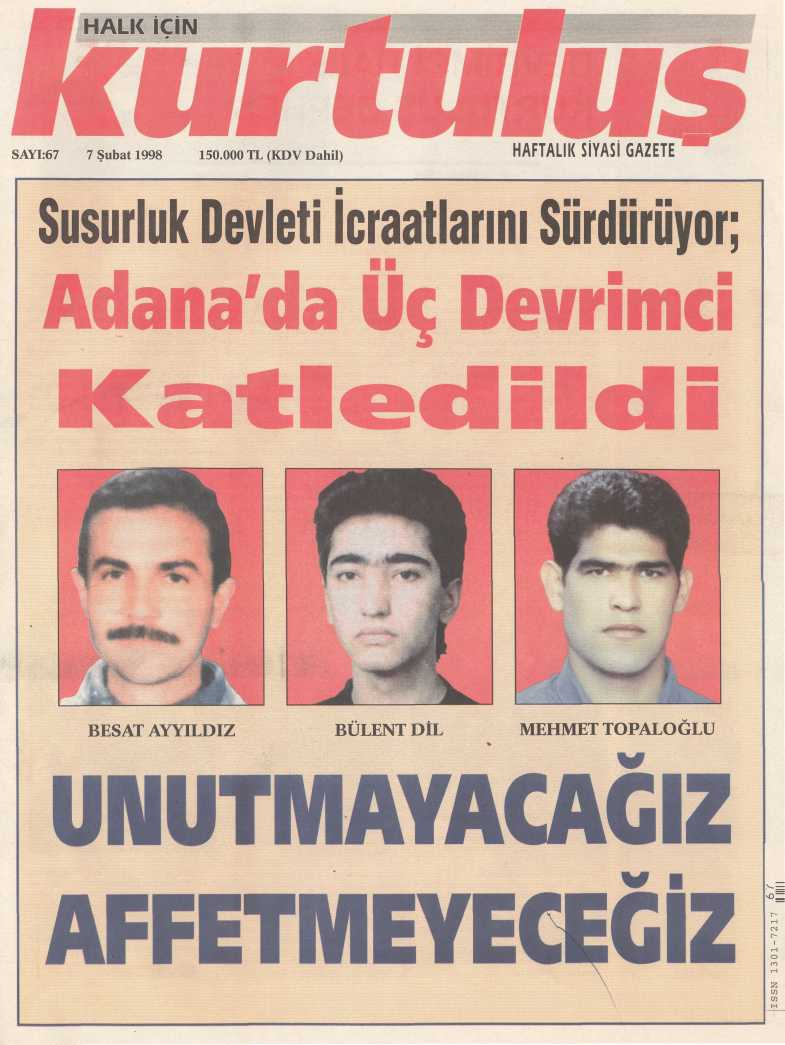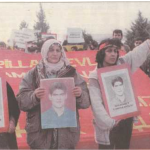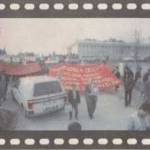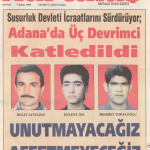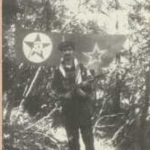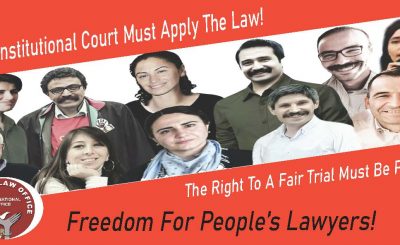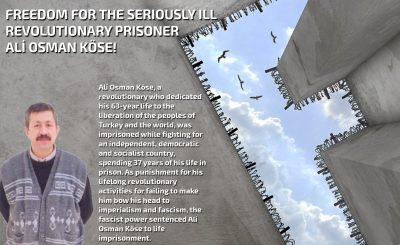REVOLUTIONARY PEOPLE’S LIBERATION FRONT
Statement № 60, February 4, 1998
On January 28, 1998, at 8.45 p.m., the police murdered, without any warning, three revolutionaries in the neighbourhood of Kiremithane, Adana, in front of the eyes of the people and the relatives of Mehmet Topaloglu. The police had surrounded the whole neighbourhood before. Three relatives of Mehmet Topaloglu were locked up in a room on the lower floor of the house the massacre took place in. Then the police used a trick to get access to the top floor of the house and murdered those who were present: Mehmet Topaloglu, Besat Ayyildiz and Buelent Dil. An investigation after the events showed the police started shooting without warning and that there had been no fire-fight. The police had the door opened in one way or the other and then they opened fire upon everybody who was in the house.
Mehmet Topaloglu: representative of the Kurtulus magazine. He had nothing to do with armed or illegal activities whatsoever. Mehmet carried valid identification papers and was known to everybody in the neighbourhood. Besat Ayyildiz and Buelent Dil on the other hand were members of a Armed Propaganda Rural Unit of the Revolutionary People’s Liberation Front, a unit which was part of the Mediterranean Command. Because of a problem which occurred, they had been forced to go down into the city, with their weapons and equipment. The claim, published in a police statement, that they had come from Sivas to carry out an action is a complete lie. They had not come to carry out an action, none.
Besat Ayyildiz (Nazmi)
 Born in 1966, in Bogazliyan-Yozgat, of Turkish nationality. The son of a poor peasant family. His childhood and youth were characterised by poverty. Because his family is poor, he had to do several jobs. His revolutionary views, his opposition towards the system, began to take shape during these years in which he saw the oppression of the people. During his time at the gymnasium, he got to know Devrimci Sol. But this did not lead to him becoming organised before he went to university. Between 1988 and 1989, while he studied at the Faculty for Languages and History, he took on himself some tasks in the youth organisation. Later he accepted responsibility for several tasks in the Revolutionary Youth in Ankara and Anatolia. He was arrested several times. He spent some time in prison. He did not succumb to the repression of the enemy. The resistance of Besat under torture and against the repression of the court was impressive and exemplary. In 1994, Besat was sent abroad for the time being. During that time he was in prison twice for a brief period. But all these imprisonments and all the torture could not change his revolutionary enthusiasm and his wish to fight the enemy. He was always enthusiastic to fight the enemy with a weapon in his hand. Before he went into the mountains in 1997, he said:
Born in 1966, in Bogazliyan-Yozgat, of Turkish nationality. The son of a poor peasant family. His childhood and youth were characterised by poverty. Because his family is poor, he had to do several jobs. His revolutionary views, his opposition towards the system, began to take shape during these years in which he saw the oppression of the people. During his time at the gymnasium, he got to know Devrimci Sol. But this did not lead to him becoming organised before he went to university. Between 1988 and 1989, while he studied at the Faculty for Languages and History, he took on himself some tasks in the youth organisation. Later he accepted responsibility for several tasks in the Revolutionary Youth in Ankara and Anatolia. He was arrested several times. He spent some time in prison. He did not succumb to the repression of the enemy. The resistance of Besat under torture and against the repression of the court was impressive and exemplary. In 1994, Besat was sent abroad for the time being. During that time he was in prison twice for a brief period. But all these imprisonments and all the torture could not change his revolutionary enthusiasm and his wish to fight the enemy. He was always enthusiastic to fight the enemy with a weapon in his hand. Before he went into the mountains in 1997, he said:
“… We’ve learned that the road to achieve our highest goals, to achieve our greatest victories, begins – and in fact also ends – with carrying out the most simple tasks. From this side of the war, we learned the determination and the perseverance of a fighter. We’ve learned that one needs to be hardened to cope with the reality of this fight of the will in all fields, that we do not know ourselves well enough, that we’ve not really overcome known or unknown weaknesses, when our will, our bodies or our knees give in, when we give the enemy the opportunity to achieve a victory, or when we are forced to reward them… We’ve learned that we have to be successful in order to expand the war. We’ve learned that we first have to finish the struggle against ourselves, that we first have to finish our renewal, before we can achieve freedom…”
Besat remained loyal to these words. He never forgot the responsibility he took from the time his feet touched the mountains, despite all the negative experiences and all the treason. Even under the most difficult circumstances, his beliefs and his bond with the Party-Front never trembled. Together with Buelent, he did everything to prevent that even a single bullet would fell into enemy hands. He did not fear death. When he fell on January 28, 1998, he left behind a heritage, fill with his bond to the revolution, the people and the Party-Front, filled with years of willingness to sacrifice and struggle. The struggle on the way Besat and his friends opened in Amanos and Torros will expand and they will live on as fighters of the Mediterranean Armed Propaganda Rural Unit.
Buelent Dil (Nidal)
 Born in 1976, in Pinarbasi, Kayseri. Of Kurdish nationality. Child of a poor peasant family. Like Besat, Buelent spent his childhood and youth in poverty. He tried to earn his living as a tea-waiter, a dish-washer, and in textile factories. In 1993, he got to know some people of Devrimci Sol when he came to Istanbul to prepare for his exams to enter university. However, these acquaintances were still very new and he tried to build up a life within the system. He didn’t see that the solution for oppression and poverty lies in the revolution. And so he went to relatives abroad in 1995, where he tried to build up a new life. But he saw that the solution was not abroad, on the contrary, oppression and discrimination even increased. Again he sought contact with the Party-Front, he wanted to fight. He took on some tasks in the organisation in England. In 1997, he was sent as a fighter to an Armed Propaganda Rural Unit of the Mediterranean Command. It was a passion for Buelent to fight in the mountains. He said:
Born in 1976, in Pinarbasi, Kayseri. Of Kurdish nationality. Child of a poor peasant family. Like Besat, Buelent spent his childhood and youth in poverty. He tried to earn his living as a tea-waiter, a dish-washer, and in textile factories. In 1993, he got to know some people of Devrimci Sol when he came to Istanbul to prepare for his exams to enter university. However, these acquaintances were still very new and he tried to build up a life within the system. He didn’t see that the solution for oppression and poverty lies in the revolution. And so he went to relatives abroad in 1995, where he tried to build up a new life. But he saw that the solution was not abroad, on the contrary, oppression and discrimination even increased. Again he sought contact with the Party-Front, he wanted to fight. He took on some tasks in the organisation in England. In 1997, he was sent as a fighter to an Armed Propaganda Rural Unit of the Mediterranean Command. It was a passion for Buelent to fight in the mountains. He said:
“… I have always felt a love for the mountains. After I got to know the Party-Front, this love even grew, it became a longing. I’m very happy the Party-Front has given me the opportunity to become a guerrilla in the mountains. I will use this chance as best I can till the end…”
The love of Buelent and Besat for the mountains will even become bigger, the massacres by the enemy will not change this, on the contrary, our enthusiasm for victory will increase more and more.
Mehmet Topaloglu
 Born in Adana, in 1972. Of Turkish nationality. Mehmet grew up in a poor neighbourhood of Adana. Although his original job was mowing-machine driver, he worked in several jobs. Because his family was poor, he had to end his education after primary school. During his struggle for survival, caused by the poverty, he was accused of having wounded somebody. In prison, he got to know the revolutionaries. He was able to compare the lives of the social prisoners with the lives of the revolutionary prisoners. The life of the revolutionaries was a new reality, which he had tried to imagine in the past, but was unable to see. He witnessed and recognised the small wars and the egoism of the social prisoners, formed by the system, prisoners he belonged to himself, and this caused him to criticise himself. He strengthened his contacts with the revolutionaries. During his time in prison, Mehmet witnessed the resistance of the Death Fast in 1996 and the and the struggle of will-power by the revolutionaries. This gave Mehmet a new perspective of life and he decided to become a revolutionary. Because will-power can be that strong, he believed he could become a revolutionary himself and he began to combat the customs of his previous life. When he was released again, he was a revolutionary. He was a person, not of the normal struggle in the neighbourhoods, he was a person of the revolution. He knew who was a friend, and he knew who was the enemy. He knew that is was beneficiary to the enemy when the people fight among each other, that it is necessary to fight the enemy instead. He had to stand up, considering the repression of the enemy against the distribution of the Kurtulus in Adana, against the fact that the office was raided again and again, that the Kurtulus readers were threatened. He was arrested dozens of times. But nobody could force him to leave the struggle. The person who was executed on January 28, 1998, by the contra-guerrilla was a human being who had started to look at the world with different eyes, who tried to learn everything anew. He was not guilty of violating any law of the system. He didn’t have any task in armed or illegal activities. His only guilt was being connected with the Kurtulus and being a revolutionary.
Born in Adana, in 1972. Of Turkish nationality. Mehmet grew up in a poor neighbourhood of Adana. Although his original job was mowing-machine driver, he worked in several jobs. Because his family was poor, he had to end his education after primary school. During his struggle for survival, caused by the poverty, he was accused of having wounded somebody. In prison, he got to know the revolutionaries. He was able to compare the lives of the social prisoners with the lives of the revolutionary prisoners. The life of the revolutionaries was a new reality, which he had tried to imagine in the past, but was unable to see. He witnessed and recognised the small wars and the egoism of the social prisoners, formed by the system, prisoners he belonged to himself, and this caused him to criticise himself. He strengthened his contacts with the revolutionaries. During his time in prison, Mehmet witnessed the resistance of the Death Fast in 1996 and the and the struggle of will-power by the revolutionaries. This gave Mehmet a new perspective of life and he decided to become a revolutionary. Because will-power can be that strong, he believed he could become a revolutionary himself and he began to combat the customs of his previous life. When he was released again, he was a revolutionary. He was a person, not of the normal struggle in the neighbourhoods, he was a person of the revolution. He knew who was a friend, and he knew who was the enemy. He knew that is was beneficiary to the enemy when the people fight among each other, that it is necessary to fight the enemy instead. He had to stand up, considering the repression of the enemy against the distribution of the Kurtulus in Adana, against the fact that the office was raided again and again, that the Kurtulus readers were threatened. He was arrested dozens of times. But nobody could force him to leave the struggle. The person who was executed on January 28, 1998, by the contra-guerrilla was a human being who had started to look at the world with different eyes, who tried to learn everything anew. He was not guilty of violating any law of the system. He didn’t have any task in armed or illegal activities. His only guilt was being connected with the Kurtulus and being a revolutionary.
The Susurluk state tries to send a message with these massacres:
“don’t stand up against the Susurluk state. Don’t become revolutionaries, because you’ll die”. If necessary, we’ll die by the thousands. We will crush this Susurluk state. We are fighting, conscious that the massacres will not stop before this state, the enemy of all the people, has been destroyed.

